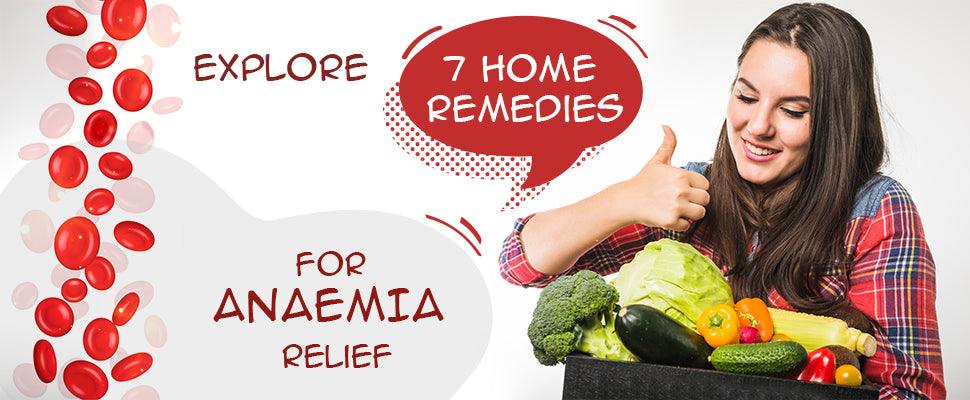Even in the age of modernization and advanced medical facilities, people are suffering from low haemoglobin count when blood tests are countered. This is not related to poverty, but several well-to-do people face this health problem as well. This is called anaemia in scientific terms and is caused when the body lacks enough healthy red blood cells to function properly.
Haemoglobin carries oxygen to different body parts through blood vessels and thus haemoglobin low levels indicate poor blood oxygen and ill-functioning of the body parts. Eventually, the situation may lead to anaemia. Proper medication and eating proper food can make it easy to avoid or fairly manage anaemic conditions. Iron deficiency is one of the major causes of anaemia. However, in this blog, we will explore what home remedies can work great for anaemic treatment!
What is Anaemia and What are the Symptoms?
Anaemia is a medical condition that is developed when the body lacks to produce a sufficient amount of red blood cells. This situation is often linked with being tired and weak as the body doesn’t have enough red blood cells and thus tissues don’t have enough oxygen to perform properly. When testing the blood reports, one can find haemoglobin low figure of anaemic patients and advised to start treatment immediately.
Symptoms of Anaemia:
-
Extreme fatigue
-
Brittle nails
-
Cold hands and feet
-
Weakness
-
Shortness of breath
-
Sore or inflamed tongue
-
Dizziness and headache
What are Effective Remedies for Anaemia Treatment at Home?
If you are finding remedies for how to increase iron levels quickly then, twist your food selection. Intake of some selected food items can raise not only your iron levels but your haemoglobin and folic acids also. Explore the special food items to be included in your daily diet:
1. Amaranth
Amaranth, a nutrient-dense, gluten-free grain, is beneficial for anaemia due to its high iron content, which aids in red blood cell production. It also contains Vitamin C, enhancing iron absorption, and folate for red blood cell formation. Include in cereals, soups, or baking to boost your diet.
2. Quinoa
Quinoa, a complete protein and whole grain, is beneficial for anaemia due to its high iron content, essential for red blood cell production. It's also rich in folate and vitamin B6, crucial for haemoglobin synthesis. Additionally, its fibre content aids digestion, while its gluten-free nature suits various diets.
3. Moringa
Not to wonder these recently-famed moringa leaves influence your haemoglobin levels. The use of moringa leaf powder effectively reduces the prevalence of anaemia and helps to increase haemoglobin levels faster. Adding this magical powder to your diet can add 25 types of B-Carotenes and thus can help you to find the answer to the question of how to increase iron levels quickly.
4. Black Sesame Seeds
Adding black sesame seeds to anaemic patients’ diets is a well-known home remedy for a long time ago. These tiny black seeds are loaded with iron, folate, zinc, copper, selenium, and vitamin B6. Consumption of black sesame seeds stimulates the body to absorb iron in the body easily. If you don’t love its slightly bitter taste, then soak those seeds overnight and consume a first thing in the morning. It is one of the sure-shot iron deficiency treatments that gives desired results quickly.
5. Beetroot
Beetroot plays a magical role in iron deficiency treatment. Apple and doctor analogy can be applied here to say one glass of beetroot juice daily, keeps the anaemia away! This pink root is rich in iron, magnesium, copper, and other vitamins such as B1, B12, B2, B6, and C. Beetroot consumption increases red blood cells and oxygen levels gradually. One can consume beetroot in cooked form or raw in salads, or make a juice of it to keep anaemia at bay.
6. Spinach
One vegetable that can serve your anaemia treatment requirement is spinach. One of the major causes of anaemia is folic acid deficiency and spinach aces here! The leafy vegetable contains a high amount of folic acid, iron, vitamin B12, and other nutrients that can significantly increase red blood cell count and haemoglobin count. Consume it in puree form or crunch its leaves over the salad. Don’t forget to add lemon zest to spinach so that it becomes easy for your digestive system to break down and absorb iron.
7. Dates and Raisins
If you are a dry-fruit lover, then preserve your love as it can increase your red blood count and can save you from becoming anaemic. Among all dry fruits, dates and raisins are counted as the top in fighting against haemoglobin low, as they are power-packed with health vitals and minerals. Dates are rich in iron, calcium, zinc, and potassium, along with vitamins A, K, and folate. Raisins can fill up the vitamin C and iron deficiency and can improve your immune system. Consuming a handful of dates and raisins at least thrice a week can show a significant effect on your haemoglobin levels in your next blood reports.
If UNICEF reports are to be believed, there are a grave number of anaemic patients across the world, especially, the younger generation of age group 15-19. Changing lifestyles, increased intake of junk food, and sitting habits are some of the modern-age causes of this serious health issue. Along with doctor-prescribed medicines, above are several home remedies that can bring affirmative changes in anaemia treatment.
Hope intake of the above-mentioned food items can help to keep you on the bay and produce sufficient red blood cells. Don’t compromise with food quality, trust only organically grown products to get more and the best out of them. Let us fulfil your requirements for organic food and get delivered to your doorsteps!


















